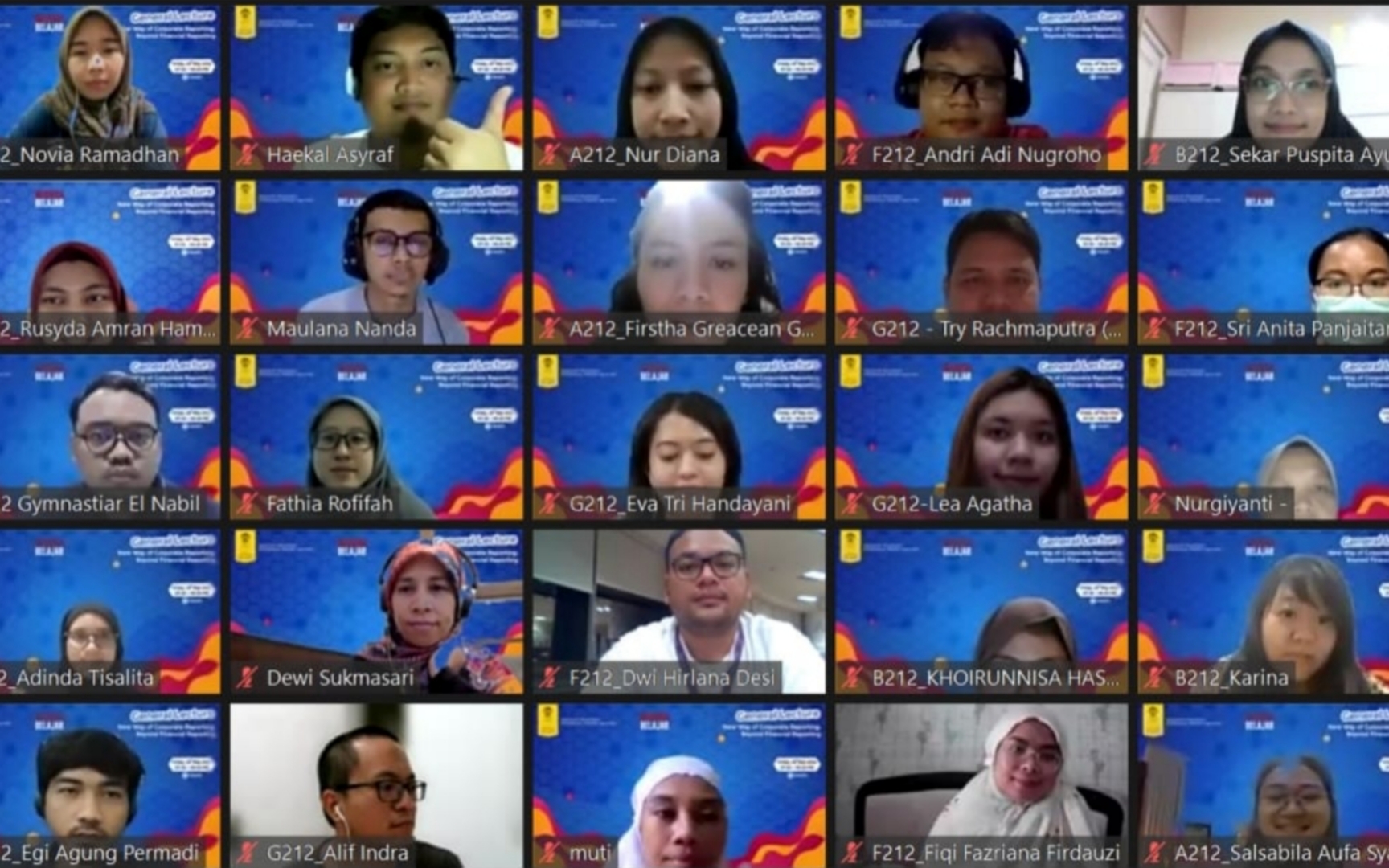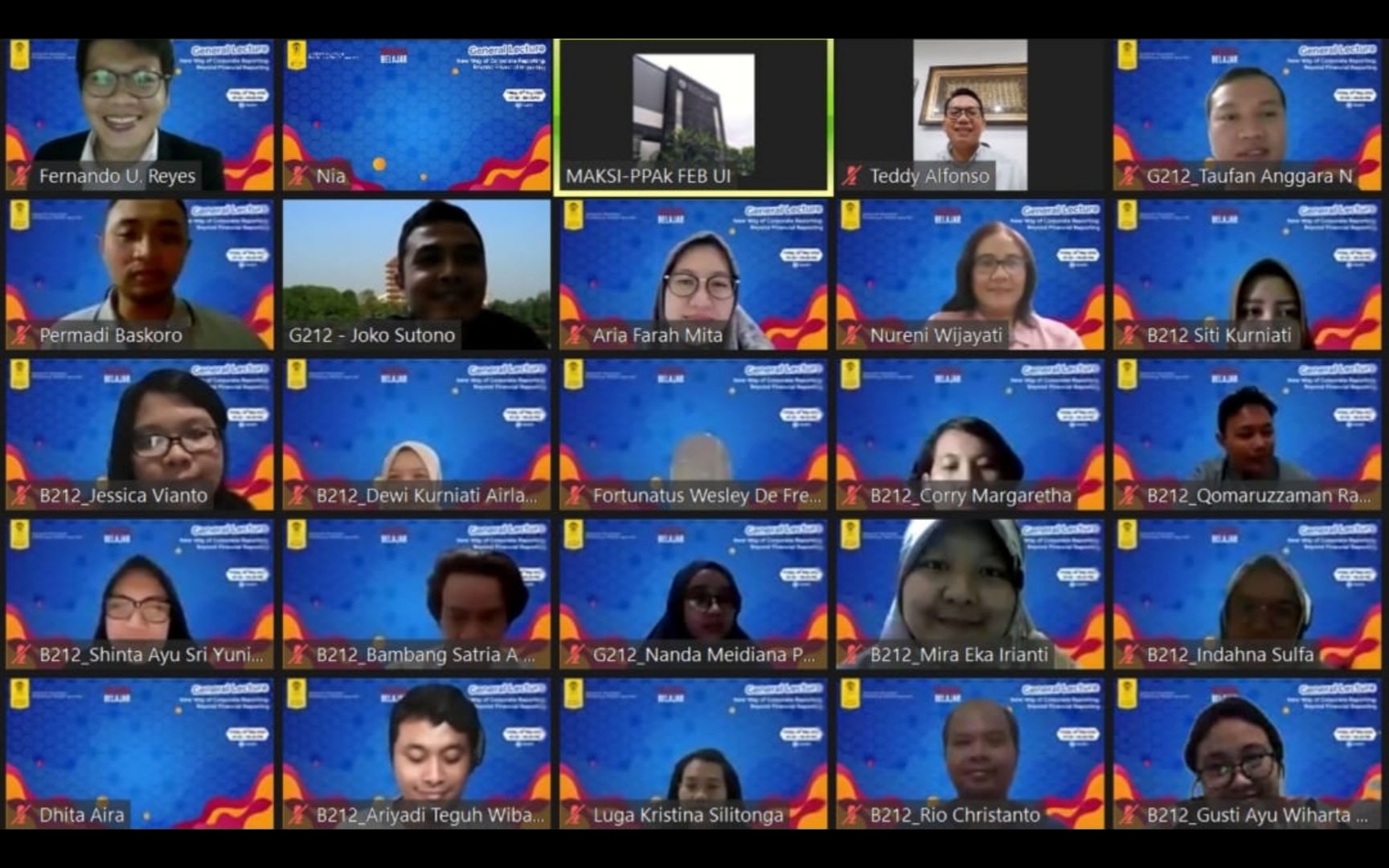MAKSI-PPAk Public Lecture. FEB UI, New Way of Corporate Reporting: Beyond Financial Reporting
Rifdah Khalisha – Public Relations FEB UI
DEPOK – (20/5/2022) Master of Accounting – Professional Accountant Education (MAKSI-PPAk.) FEB UI jointly held a Corporate Reporting Public Lecture entitled “New Way of Corporate Reporting: Beyond Financial Reporting” on Friday (5/20). Presenting speaker Fernando U. Reyes (KPMG Indonesia, Member of EER Task Force IAPI), host Dr. Aria Farah Mita, M.S.M. (Secretary of MAKSI-PPAk Study Program. FEB UI).
Starting the lecture, Professor of FEB UI Prof. Dr. Sylvia Veronica Narulita Purnama Siregar, C.A. said in the opening speech, “Actually, corporate or company reporting does not only discuss financial reporting, but there are still other forms. The needs of stakeholders, such as investors and creditors, are not limited to financial information alone. Many other reports emphasize non-financial aspects, including sustainability and integrated reports.”
“As we know, preparing financial statements in Indonesia refers to the Statement of Financial Accounting Standards (PSAK). Other corporate reporting, such as sustainability reports, also needs guidelines. Currently, we do not have a uniform reference. However, we can use several existing frameworks, such as the Global Reporting Initiative (GRI), Task Force on Climate-Related Financial Disclosures (TCFD), and so on.”
However, there have been concerns about the multiplicity of terms of reference regarding the comparability of sustainability reports. There is a push to standardize these frameworks. Therefore, MAKSI-PPAk. presents speakers who are competent in their fields to discuss corporate reporting more broadly.
The corporate reporting landscape has changed. According to Fernando, various trends rapidly challenge views on the relationship between business, economy, and society.

He explained various factors that have a significant influence on corporate reporting in general and corporate sustainability reporting more precisely, including
- Growing awareness that corporate performance depends on financial, social, environmental, governance strategies, and outcomes;
- demands for companies to consider multiple resources (not only financial) in creating value, managing dependencies, and their impact on the environment;
- New thinking about the role of corporations is not only for private interests but will benefit the public interest, society, and other stakeholders.
Key Drivers of Change and the Importance of Sustainability Reporting
“Corporate sustainability reporting is a widespread practice. It is largely institutionalized but will continue to evolve and grow. Initially, sustainability reporting was just a ‘nice to have, and then it has shifted its status to a ‘need or requirement’ within a company,” says Fernando.
A recent change’s key drivers will impact organizational sustainability—first, the economy. The COVID-19 pandemic has significantly impacted the economy and created the most significant challenges, ranging from rising income inequality, unemployment, and technological upheaval. At the same time, rising US-China trade tensions and growing concerns over protectionism and regionalization threaten global supply chains.
Second the environment. The consequences of global warming extend to many ecosystem challenges, from floods, water shortages, storm damage, forest fires, and humanitarian conflicts, to population displacement.
Third, society. Stakeholders now demand greater accountability, inclusiveness, and transparency about corporate operations and their social impacts. Organizations worldwide increasingly understand that they must be good corporate citizens, provide social value to communities, treat employees, customers, and other stakeholders appropriately, and deliver financial returns to shareholders.
The importance of sustainability reporting is increasing due to increased scrutiny from stakeholders regarding public relations activities. In addition, Environmental, Social, and Governance (ESG) considerations have attracted business attention as companies increasingly need to consider their impact on stakeholders and the environment. The majority of investors also look for ESG reports guiding their investment decisions.
Hence, Fernando says, “Effective reporting is needed to convey the ESG narrative to investors and other stakeholders, comply with relevant reports and strengthen reputation and value.”
Global Reporting Framework Standards
Companies and planners ask for a globally accepted reporting framework standard to avoid confusion. In September 2020, five organizations-the GRI, Climate Disclosure Standards Board (CDSB), International Integrated Reporting Council (IIRC), and Sustainability Accounting Standards Board (SASB)-announced a shared vision for a comprehensive corporate reporting system.
They committed to collaborating to achieve this through a paper titled “Statement of Intent to Work Together Towards Comprehensive Corporate Reporting,” with International Financial Reporting Standards (IFRS) taking the lead, bringing together different perspectives.
Accountants Should Lead Corporate Reporting
Finally, Fernando said that accountants are better positioned to lead the new way of corporate reporting as they are at the center of information flows and decision-making, tasked with capturing, analyzing, reporting, and assuring sustainability information.
Accountants have the relevant skills and competencies to link financial and sustainability information. As a regulated profession, professional accountants are subject to a code of ethics, applying the IAASB’s SAE 3000 (Revised) compliant quality management standards and ethical frameworks that enhance credibility and trust in sustainability disclosures. Moreover, professional accountants are globally connected to meet the needs of clients, capital markets, and global supply chains. (hs)




